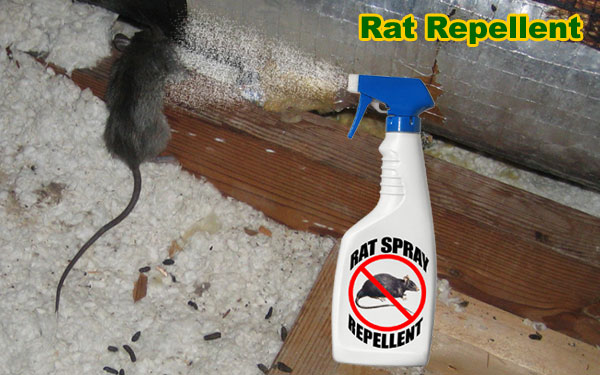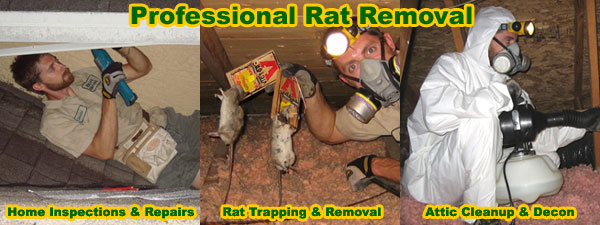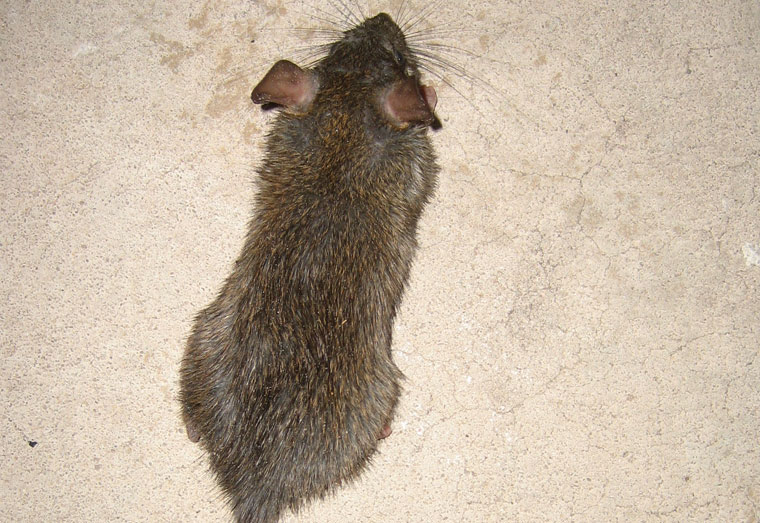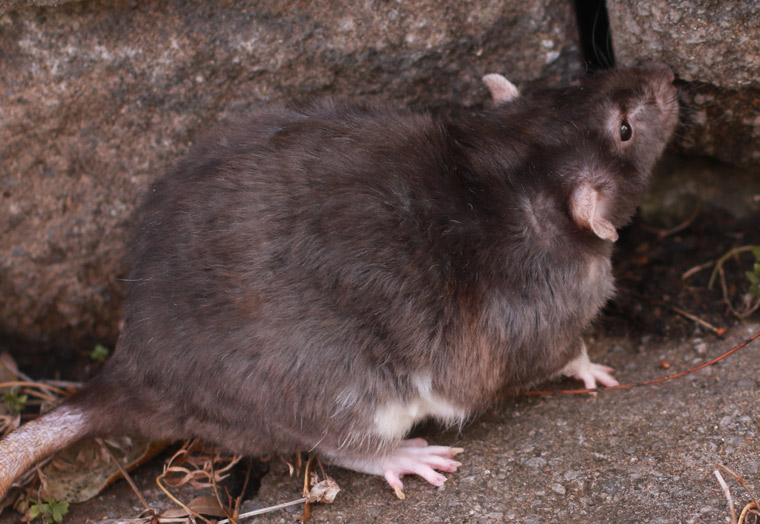- info@wildlife-removal.com
Call us for help in your town
Wildlife Removal Education
Rat repellent, natural home remedy, recipes for rodent deterrent
Need rat removal in your hometown? We service over 500 USA locations! Click here to hire us in your town and check prices - updated for year 2020.
Ammonia? Peppermint? Cat Urine? Human Hair? Mix them all together in a paste?
I know you want an easy solution to your rat problem, and a cheap one too. That's natural, always look for the simplest solution first! But the truth is that it is not so easy to keep rats away. However,
it can be done, and PERMANENTLY.
If you have rats getting into your house, and want to keep them away, there is an excellent 100% effective natural rat repellent -
it's called finding and
sealing shut all the entry holes in your house that the rats are using to gain entry. That's it. That's by far the most effective, and the ONLY REAL effective
way to keep away rats for good. I have seen several hundred cases of rats in homes, commercial buildings, warehouses, restaurants, attics, basements, etc, and
I have seen people try every trick in the book - every type of trap and every type of repellent sold, and none of them work in the slightest. The only way
to solve a problem with rats is to deny them access, to physically block them out of the house. Read here for photos of how are rats getting in - a guide that shows 90% of the areas rats use to enter homes and buildings.

It'd be nice if there was a cheap and easy solution to your rat problem But with a rat problem,
there is no quick and easy solution. Rats have been a huge problem for humankind for thousands of years! If there were a foolproof easy repellent that actually
worked, don't you think everyone would use it? If there actually was a spray or powder or machine that kept rats away, why do you think there are thousands of
companies dedicated to rat control? See my 2018 USA list of Professional Rat Removal Companies for more info.
The bottom line is that rats know that it's literally a rat-eat-rat world out there. If a rat has established a successful place to live, it knows that if it
leaves that place, it will die. Guaranteed. If a rat is forced out of a house, into the elements outside, or if it tries to go into another rat's territory,
it will be quickly killed, it will lose all access to the shelter and resources it needs to live. In a life or death scenario, a rat will never leave a territory,
for any reason - especially not a bad smell or noise. Not even a threat like a cat works.

I will now examine several of the products or devices people say work as rodent deterrents:
Moth Balls - Ah, mothballs, the end-all be-all animal and rodent repellent product sold on the market today. Cheap to make, and easy to market to unsuspecting
and gullible shoppers, mothballs, or naphthalene as the chemical is called, is the ingredient in so many "bat away" and "squirrel-be-gone" and "rat magic" products
sold out there. Your grandmother swears that sprinkling mothballs keeps the rats away. Three things: mothballs are a known carcinogen (cause cancer in humans), they
poison the environment, and rats don't give a crap. I've been in attics with up to 50 pounds of mothballs (and
homeowners now suffering headaches) and the rats are
still running all over the place. Mothballs don't work.
Ammonia - Similar to the above, ammonia smells bad, so it's thought that it'll make rats move out. Again, no rat is going to leave its home to face certain
death outside, because of a bad smell.
Peppermint Oil - Um, yeah. I've actually used peppermint as BAIT on rat traps, and caught rats! Sure, peppermint is going to keep them away! So is pineapple juice,
lady's deodorant, and licorice! Give me a break. The number one search result for rat repellent right now is a bag of corn cob chips and other essential oils, including
eucalyptus, grapefruit, sage, and lavender! A bag of potpourri essentially! AARRRGGHHH!!!
Toilet Cakes - I only list it here, because it's again a top search result. Toilet cakes? Toilet cakes. Will keep away rats. Okay, go put some toilet cakes
in your attic and walls, I'm sure the rats will stream out of your house in terror.
Human Hair - Yeah, I've heard of people swearing by this. These people are bordering on witchcraft for the mentally handicapped. I think the theory here is
that rats aren't supposed to like the smell of humans. First of all, your house already smells like humans. Second of all, RATS LOVE HUMANS. That's how they live
and thrive! They are the #1 commensal animal, designed to live in urban areas with humans! Human hair smells like home to a rat.
Predator Urine - Not a bad idea. It's a good theory: surely the smell of a dangerous predator, like a cat, or bobcat, or coyote, or whatever, will scare the
rats away, right? Well, here's the thing. Rats have ALWAYS lived in proximity with predators. It's a fact of life. They know that they've got to hide in the
shadows, in the small gaps, to stay perfectly still and move only when all is safe. That's how they survive. But they don't shy away when a predator is nearby. Again,
as stated, rats know that if they lose their home (your attic, for example), they are facing certain death outside. So they'll brave the smell of predator
urine, because it's still their best option for survival to stay, and move by shadow.
A Live Cat - Yes, cats are great hunters, and will kill rats. But will they kill the rats in your attic and walls? Unfortunately not. I can't tell you how many
cases of rat infestation I've gone to in homes with pet cats. It happens every week for me. Same goes for dogs, of course, even good ratters like Jack Russell Terriers.
Sound Machine - These high-pitch ultrasonic sound machines are marketed as fancy new high-tech pest control for every critter out there. They don't work at all. Study
after study has proven it, and the FTC has issued a warning against the false claims of these
fraudulent devices. I've seen several of them installed in attics, and not
work a bit.
Strobing Light Machine - Another fancy-looking gimmick product. The rodents just don't care.

Okay then, as stated at the top, the only real rat repellent is to find out how they are getting into the house, and sealing those entry points shut. Completely natural,
safe on the environment, and the only totally effective way to solve a rat problem! Read some of my below articles for more information on rat control, or if you want
to talk to an expert in person, See my Map of Professional Rat Removal Companies. If you want to go ahead and try any of the
above rat repellent products or devices, feel free! Then later when you realize that you need to actually find the holes and seal them out, do so, or hire a company to
do so properly. Now that you know that there are no effective repellent products, the below LINKS should help you:
Rat removal info - main rat removal information page.
How to trap a rat - you're going to have to trap a few as well, so you need to read this too.
How to get rid of rats - just another general guide.
Rat in building - general information on different parts of buildings rats get into.
Rat damage photos - just so you know what they are capable of, and so you can see the signs.
Pest control for rats - why to never hire a regular pest control company to do rat work.
How to kill a rat - another guide, helping to humanely solve the problem.
Rat prevention - some tips to keep rats away, and lessen the number in the area.
Rats in the attic - a good guide to one of the most common problem areas with rats.
Photos of rat poop - for identification purposes.
How to Keep Rats Away from Compost Heaps - a guide to keeping rats out of compost.
What Kind of Bait Will Trap Rats? - a guide for the best rat baits.
Do Light or Sound Machines Work to Get Rid of Rats? - guide for using deterrent machines against rats.
Can Live Trapping Rats Work to Get Rid of Them? - should you use live trapping to get rid of rats?
The One Rat Removal Method that DOESN’T Require Poison, Trapping or Dead Rats - tips on alternative removal methods.
I will now address some of the more common questions that I receive about rats getting into a building:
Rat repellent for the attic - as discussed above, none that work, other than blocking entry, and trapping and removing rats.
Rat repellent for the basement - same thing. No such thing as an effective detterrent for rodents in the cellar.
Rat repellent for the car - if rats are getting into your car, it's best to try to keep the area free of garbage and other attractants, or keep your car in a garage. Other than that, there's nothing you can do.
Rat repellent for the garden - I feel for you here, I really do. Here I actually recommend a cat or two. A cat won't work for rats inside a building, but it will work for rats in the garden.
Rat repellent for the back yard - Same as the garden, a cat is probably your best bet. No point in trying trapping or poisoning outside.
Rat repellent for the toilet - as long as there is water in the pipes, you should be okay.
Customer Rat Email: I just came across your website and wanted your input on how i should handle my situation. I am 99.99% confident that i have rats in my house,
specifically above my ceiling in the basement. They usually only come in during the winter months, when it gets cold. i can hear them scurrying about and occasionally fighting
above me. and for the first time last winter they had some babies in the wall. i could hear them squeaking. I read your tips for eliminating the pests and agree with you 100%.
My problem is that i believe that the rats are entering under our back porch. we had built a solidly built wooden porch(right next to our garbage area) over the existing concrete
and brick staircase, and now there is no way to get under the porch and find out where they are coming in from, (at least i cant fit under the porch). i have been using the
poisons and inevitably they die in the ceiling with a stench that is pretty bad (but i run the dehumidifier to remove all moisture from the area so that the bacteria on the carcass
cant survive), but what always happens is that the following spring, flies come in lay their eggs on the carcass, and i have about 100 flies in the basement. My question is what
is the next best method to find the entry point? Or is there some recipe for a natural rat repellent that I can use? i was thinking about tearing down the ceilings along the walls that are closest to the back porch , but am not looking fwd to it.
Also i dont know if im freaking out or imagining things but i have noticed some spotty brown staining on the ceiling in my room, i dont know if this could be from their urine, or
if its from the grease they are tracking in? Thanks for listening, Justin
My Response: Yes, it's more common for rats to enter a house during cooler winter weather. To answer your questions, no, there is definitely no repellent that will keep them
away. But to your other question, how to find their entry points, that's the vital thing. It basically just takes a very detailed inspection of the home, including every part of the
roof, all the vents, the plumbing, etc. Once the entry areas are sealed shut, the rat problem goes away forever. A repellent, even if one did work, would only be a band-aid.
Will Mothballs Work to Get Rid of Rats?
Ammonia and mothballs are actually quite frequently advised for a number of pest animal problems, rats being just one of them. Sadly, we are faced with the product of repellents-gone-wrong on a daily basis, often called in to homes and business properties after DIY rat removal hasn't worked. Ammonia and mothballs are two items that rat removal exerts have the biggest problems with, and once you do your research into them - and how they are meant to work against wild animals - you can start to understand why.

Why do we use mothballs or ammonia to repel rats/animals?
The idea is simple - both mothballs and ammonia give off toxic gases that are unpleasant to inhale and smell. Humans don't like it much, and neither do wild or domesticated animals. When one or the other (or both) are used in a particular space, all animals are expected to evacuate that space.
Will ammonia or mothballs work to get rid of rats/animals?
Ammonia or mothballs might very well move the pest animals from one place to another, but that's as far as the story goes. You have absolutely no control over where they end up, which direction they decided to travel, or even how they leave. In some instances, the animals do not leave at all, instead just moving slightly further afield to avoid the noxious gases, and in others, they die.
Will ammonia or mothballs kill rats/animals?
When used in high enough amounts or with repeated exposure, wild and domesticated animals alike can become rather sick from inhaling the gases given off by mothballs and ammonia. People can also become sick. Respiratory problems, irritated eyes, headaches - The longer you use this stuff the more dangerous it can be for your health, and the health of other living things around you too.
There is a very high chance that ammonia or mothballs WILL kill off the rats/animals that you're trying to repel, not only presenting you with further problems down the line (such as, trying to locate and then dispose of the carcasses), but there's also a great chance that you will accidentally harm an animal that you didn't intend to bring harm to.
Do you recommend using ammonia or mothballs to repel rats?
No. We do not recommend using ammonia or mothballs to repel rats or any other pest animal. In almost every case, there is a much better solution than trying to repel or deter pest animals, such as actually solving the problem by sealing up the building, removing all traces of food, and, in the specific case of rats, using kill traps to help keep rodent populations down.
Rats & Repellents: The Truth
If you want the real, honest truth, using repellents for rats simply doesn't work. It doesn't matter which one you choose, or even if you use them all together, there is a much higher chance that your approach will fail than succeed.

Of course, many home and business owners do not want to hear this. They want to hear that peppermint will definitely get rid of rats in the basement, or ammonia with mothballs will absolutely repel any rats that are hiding up in the attic. It is almost expected that a customer will go through a number of DIY methods before finally giving up and calling in the professionals - expert rat removal technicians. It's not so much a complex job, like the removal of bats or other wild animals, but rat removal is still definitely a hard task, and one that takes a great deal of forward planning.
The reasons behind rat repellents not working are plentiful:
1 - You have no control over where the rat is "repelled" to, therefore, running the risk that those rats will just hide somewhere else in the building and not outside and away from your property.
2 - The repellents might not even repel the rats in your building at all. Many taste or smell-aversion therapies have actually been shown not to have any effect on rodents, including using citrus and other sharp smells/tastes.
3 - The longer you leave a rat problem in your building, the more damage those rats have the potential to cause. And we could be talking a repair cost that runs into the thousands of dollars. They can be pretty destructive for something so small.
4 - The longer you leave a rat problem in your building, the faster those rats will be reproducing. Rodents breed at an astounding rate and you will find yourself with more of them on your hands than you know how to deal with.
5 - The longer you leave it before you call in the professionals or deal with the problem properly, the more expensive the removal job will be. The sooner you get it sorted, the cheaper it will be.
6 - Rat repellents do not deal with the root of the problem - food is attracting those rodents to your property and are keeping them around.
7 - Using repellents doesn't clean up after the animals. Any biological matter that has been left behind will give off pheromones that attract other animals, including other rats.
8 - Using repellents will not seal the holes in your building that are letting rats in, therefore, not fixing the problem at all. You will often need to undergo a pretty thorough inspection process before you can even start the sealing project.
9 - Certain repellents that have been advised for rats and other rodents, particularly on the internet, are very dangerous/toxic, and could cause death or harm to other animals, including domesticated pets, and children/vulnerable adults.
10 - Some rat repellents might actually attract animals, including rats, rather than repelling them. In other cases, those repellents might attract flies, maggots, or other pests too.
We could continue for some time, but it's pretty safe to say that repellents for rats are not a good idea. There are quite a few that you could choose from too, including some of these:
Mothballs
Ammonia-soaked rags
Citrus smells, including lemon juice and lime peel
Spicy and hot food, including chili flakes or powder or spicy peppers
Light devices, including intruder/motion sensor lights
Ultrasonic sound devices
Water repellents for pest animals
In many cases, these repellents are inexpensive when used over the short term, but you must remember that repellents tare a long-term approach. You can't just use them for a short time and then stop, otherwise the rodents will just come back.
If you're asking for our personal opinion, all business-related decisions aside, you are much better off giving an expert a couple of hundred bucks to put the job right, than waste hundreds and hundreds of bucks on repellents that have been shown time and time again not to work.
Go back to the Rat Removal page, or learn tips to do it yourself with my How to Get Rid of Rats guide.


















